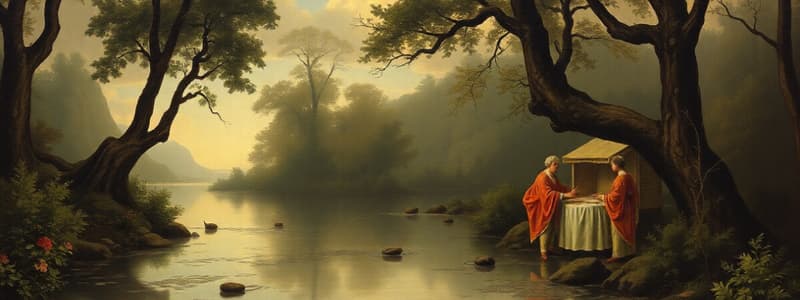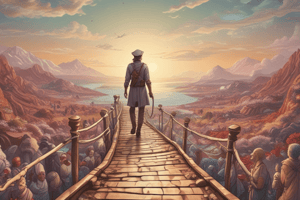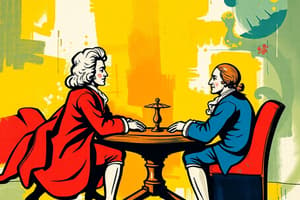Podcast
Questions and Answers
According to Rousseau, what does interdependence lead to?
According to Rousseau, what does interdependence lead to?
- Inequality (correct)
- Happiness
- Freedom
- Self-sufficiency
Rousseau believes that solitude and autonomy are unnatural states for humans.
Rousseau believes that solitude and autonomy are unnatural states for humans.
False (B)
What is Rousseau's view on the concept of 'savage man'?
What is Rousseau's view on the concept of 'savage man'?
Savage man is defined as someone living without social ties or the need for others, in a state of nature.
According to Rousseau, _______ and society are considered antonyms.
According to Rousseau, _______ and society are considered antonyms.
Match the following concepts with their descriptions according to Rousseau's views:
Match the following concepts with their descriptions according to Rousseau's views:
What does Earth represent in the context of dependency and vulnerability?
What does Earth represent in the context of dependency and vulnerability?
Rousseau's critique suggests that human freedom is equated with total autonomy.
Rousseau's critique suggests that human freedom is equated with total autonomy.
What is the 'Big, brave question' raised in the context of capitalism?
What is the 'Big, brave question' raised in the context of capitalism?
The concept of UTOPIA illustrates that _____ can be expropriated.
The concept of UTOPIA illustrates that _____ can be expropriated.
Match the following ideas with their respective critiques:
Match the following ideas with their respective critiques:
Which phrase best captures the essence of the critique of rationalist techno-scientific Utopia?
Which phrase best captures the essence of the critique of rationalist techno-scientific Utopia?
The text suggests that life, liberty, and the pursuit are ideals achieved on Earth.
The text suggests that life, liberty, and the pursuit are ideals achieved on Earth.
What is the term used by Rousseau to describe the idealized version of humans in their natural state?
What is the term used by Rousseau to describe the idealized version of humans in their natural state?
Rousseau believed that modern society is aligned with nature.
Rousseau believed that modern society is aligned with nature.
What did Rousseau critique through his idea of returning to nature?
What did Rousseau critique through his idea of returning to nature?
Rousseau's radical utopianism challenges the structures of __________ in society.
Rousseau's radical utopianism challenges the structures of __________ in society.
Match the following concepts with their descriptions related to Rousseau’s ideas:
Match the following concepts with their descriptions related to Rousseau’s ideas:
Which of the following does Rousseau associate with a 'natural order'?
Which of the following does Rousseau associate with a 'natural order'?
Rousseau’s vision is characterized by an embrace of modern technology and civilization.
Rousseau’s vision is characterized by an embrace of modern technology and civilization.
What does Rousseau believe must be balanced in human cultivation?
What does Rousseau believe must be balanced in human cultivation?
The term _________ refers to individuals that Rousseau criticizes for performing dehumanizing work.
The term _________ refers to individuals that Rousseau criticizes for performing dehumanizing work.
According to Rousseau, the 'natural man' is characterized by which of the following?
According to Rousseau, the 'natural man' is characterized by which of the following?
What does Rousseau argue is an essential gift of nature?
What does Rousseau argue is an essential gift of nature?
According to Rousseau, inequality is a natural part of human existence.
According to Rousseau, inequality is a natural part of human existence.
What is the revolutionary principle affirmed by Rousseau?
What is the revolutionary principle affirmed by Rousseau?
Rousseau asserts that governments derive their just powers from the ______ of the governed.
Rousseau asserts that governments derive their just powers from the ______ of the governed.
Match the following concepts with their descriptions:
Match the following concepts with their descriptions:
What does Rousseau imply about the treatment of domestic versus wild animals?
What does Rousseau imply about the treatment of domestic versus wild animals?
The Declaration of Independence claims that all men are created equal.
The Declaration of Independence claims that all men are created equal.
What do the 'causes which impel them to the separation' refer to in the context of the Declaration of Independence?
What do the 'causes which impel them to the separation' refer to in the context of the Declaration of Independence?
Rousseau suggests that the focus on _______ leads to a degradation of man's true nature.
Rousseau suggests that the focus on _______ leads to a degradation of man's true nature.
Match the following statements with their corresponding principles:
Match the following statements with their corresponding principles:
What is suggested about sociability in a primitive state?
What is suggested about sociability in a primitive state?
The introduction of property and labor improved human conditions in society.
The introduction of property and labor improved human conditions in society.
What two principles form the basis of morality in the State of Nature?
What two principles form the basis of morality in the State of Nature?
As long as men remained satisfied with their rustic huts and clothing made of __________, they lived free and happy.
As long as men remained satisfied with their rustic huts and clothing made of __________, they lived free and happy.
Match the following terms with their corresponding descriptions:
Match the following terms with their corresponding descriptions:
What happens when one man begins to need another's assistance?
What happens when one man begins to need another's assistance?
In a primitive state, human bonds were characterized by lasting relationships.
In a primitive state, human bonds were characterized by lasting relationships.
What is implied about language in the primitive state?
What is implied about language in the primitive state?
The state experienced _______ as people began to work the land and establish property.
The state experienced _______ as people began to work the land and establish property.
Match the following concepts with their consequences:
Match the following concepts with their consequences:
Flashcards
Critique of Rationalist Utopia
Critique of Rationalist Utopia
A critique of rationalist, techno-scientific Utopia, where happiness is achieved through logic and technology, ignoring the complexities of real life.
Earth-Escape Fantasy
Earth-Escape Fantasy
The idea that escaping Earth, whether literally or metaphorically, offers a solution to problems on Earth, but it's actually an impossible fantasy.
Earth as Interconnectedness
Earth as Interconnectedness
The concept of 'Earth' not only includes the planet itself but also our interconnectedness with all living beings, including humans, animals, plants, and the environment.
Human Freedom as Autonomy
Human Freedom as Autonomy
Signup and view all the flashcards
Utopia in Thomas More's 'Utopia'
Utopia in Thomas More's 'Utopia'
Signup and view all the flashcards
Beyond Private Property, Money, and Inequality
Beyond Private Property, Money, and Inequality
Signup and view all the flashcards
Capitalism's Constraint on Social Dreams
Capitalism's Constraint on Social Dreams
Signup and view all the flashcards
Rousseau's State of Nature
Rousseau's State of Nature
Signup and view all the flashcards
Assimilation
Assimilation
Signup and view all the flashcards
Expulsion
Expulsion
Signup and view all the flashcards
Caste System
Caste System
Signup and view all the flashcards
Gerontocracy
Gerontocracy
Signup and view all the flashcards
Rousseau's view on Human Nature
Rousseau's view on Human Nature
Signup and view all the flashcards
Natural Order
Natural Order
Signup and view all the flashcards
Rousseau's Critique of Modern Society
Rousseau's Critique of Modern Society
Signup and view all the flashcards
Rousseau's Utopianism
Rousseau's Utopianism
Signup and view all the flashcards
Social Life as a Threat to Flourishing
Social Life as a Threat to Flourishing
Signup and view all the flashcards
The 'Natural Man'
The 'Natural Man'
Signup and view all the flashcards
The Unnaturalness of Society
The Unnaturalness of Society
Signup and view all the flashcards
Nature vs. Society
Nature vs. Society
Signup and view all the flashcards
The Absence of Society in 'Savage' People
The Absence of Society in 'Savage' People
Signup and view all the flashcards
Rousseau's Critique of Inequality
Rousseau's Critique of Inequality
Signup and view all the flashcards
Rousseau's Justification for Revolution
Rousseau's Justification for Revolution
Signup and view all the flashcards
Natural Rights in Rousseau's Philosophy
Natural Rights in Rousseau's Philosophy
Signup and view all the flashcards
Rousseau on Legitimate Rebellion
Rousseau on Legitimate Rebellion
Signup and view all the flashcards
Declaration of Independence & Rousseau
Declaration of Independence & Rousseau
Signup and view all the flashcards
Rousseau's Critique of Sociability
Rousseau's Critique of Sociability
Signup and view all the flashcards
Rousseau's Idea of Bastardization
Rousseau's Idea of Bastardization
Signup and view all the flashcards
Rousseau's Use of Animal Analogy
Rousseau's Use of Animal Analogy
Signup and view all the flashcards
Rousseau's Questioning of True Connection
Rousseau's Questioning of True Connection
Signup and view all the flashcards
State of Nature: Self-Sufficiency
State of Nature: Self-Sufficiency
Signup and view all the flashcards
Language: Unnatural Sociability
Language: Unnatural Sociability
Signup and view all the flashcards
Morality in the State of Nature
Morality in the State of Nature
Signup and view all the flashcards
The Fall from Self-Sufficiency
The Fall from Self-Sufficiency
Signup and view all the flashcards
Civilization's Impact on Health
Civilization's Impact on Health
Signup and view all the flashcards
The State of Nature: Boundless Forests
The State of Nature: Boundless Forests
Signup and view all the flashcards
Random Encounters: No Lasting Bonds
Random Encounters: No Lasting Bonds
Signup and view all the flashcards
The Rise of Deception and Misery
The Rise of Deception and Misery
Signup and view all the flashcards
The Fall: Deceptive Bounty
The Fall: Deceptive Bounty
Signup and view all the flashcards
Idleness: A State of Natural Harmony
Idleness: A State of Natural Harmony
Signup and view all the flashcards
Study Notes
Rousseau's Critique of Utopia
- Rousseau criticizes rationalist and techno-scientific utopias
- He sees these utopias as fantasies of escaping Earth's problems
- Earth, for Rousseau, represents interdependence and entanglement
- This includes race, class, gender, disability, animality, and materiality in various forms of dependency and vulnerability
Utopia and its Requirements
- Utopia needs a society in alignment with natural law
- It requires a simple and natural existence
- A natural order is important, including patriarchy and gerontocracy
- A balance between manual and mental cultivation is also a requirement
The Idea of the "Noble Savage"
- Rousseau valorizes the uncultivated, uncivilized, and unsocialized "natural man"
- He views the "state of nature" as a contrasting ideal to civilization
- This critique challenges the modern notion of human progress
- He differentiates between natural and social inequalities
Rousseau's Question and Enlightenment
- The Academy of Dijon posed a question about the origin and necessity of inequality
- "Enlightenment" is a period of reason, doubt, and public sphere explosion
- His ideas are a radical reversal in modern philosophy
- He questions the conventional notion of human progress
The State of Nature in Rousseau
- Rousseau describes the "state of nature" as a thought experiment
- He imagines humans in a primitive condition, free from societal structures and constraints
- He finds humans initially as solitary, with a basic drive for self-preservation
- He contrasts the savage man to modern, socialized man
- He finds savage man as naturally good
Rousseau's "Back-to-Nature" Utopia
- Rousseau proposes a radical "back-to-nature" thought experiment
- It is a critique of modern society's alienation from natural impulses
- His theory questions the naturalness of social inequalities
- The radical experiment is a critique of modern society
Rousseau's Critique of Labor
- Rousseau critiques the concept of ownership and private property, viewing them as sources of conflict and inequality
- He focuses on the concept of natural indolence
- He sees labor and civilized society as a source of misery and suffering
Rousseau's Relationship with Sociability
- Rousseau views sociability as a hindrance to true freedom and happiness
- He contrasts sociability with solitude, autonomy, and self-sufficiency
- Rousseau believes these are necessary for a natural state
Natural Man and Inequality
- Rousseau distinguishes between natural and moral inequalities
- He rejects the idea that social inequality is inevitable or decreed by natural law
- He asserts that natural inequalities cannot justify social inequalities
Rousseau and the Declaration of Independence
- Rousseau's rhetorical and logical ideas echo sentiments found in the Declaration of Independence
Non-Human Nature's Requirements
-
A vast wilderness is essential for subsistence and disappearance, particularly for man's self-preservation
-
Rousseau acknowledges the crucial role of non-human nature in the "natural" man's existence.
Studying That Suits You
Use AI to generate personalized quizzes and flashcards to suit your learning preferences.
Related Documents
Description
This quiz explores key concepts in Rousseau's philosophy, focusing on interdependence, the notion of 'savage man', and critiques of society and capitalism. Understand Rousseau's views on autonomy, dependency, and the idea of UTOPIA as it relates to human existence and societal constructs.




